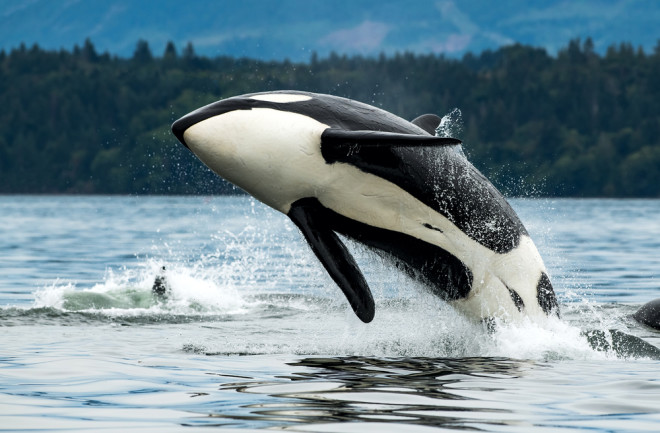In recent years, orca whales have repeatedly made headlines after attacking — and, in several cases, capsizing — ships off the coast of Spain and Portugal.
Though none of these incidents involved direct harm to any humans, the belligerent behavior caused a stir, prompting many to once again question the threat marine mammals pose to humans. After all, orcas (Orcinus orca), also known as killer whales, sit at the top of the marine food web, and these highly-efficient apex predators are capable of adapting to overcome almost any prey. Still, does that mean that human is on the orca menu?
Fortunately for us, orcas aren’t known for attacking (or eating) humans: Despite their reputation for devouring other marine mammals, they almost never attack people in the wild.
Much like how great white sharks favor seals' blubber-rich hides, and generally don’t target less-fatty hominids like us, experts also believe that killer whales just aren’t as drawn to human flesh when compared with other fare like, say, nutrient-rich salmon.
What Do Orcas Eat?
That isn’t to say that orcas aren’t dietarily diverse. Throughout the world's oceans, pods specialize into meal plans that best suits their environment. Antarctic communities, for example, have a taste for penguins and seals, sometimes banding together to execute novel hunting strategies.
Some orcas even chase down larger marine mammals, including whales. And while orcas usually go after calves, rather than adults, there are exceptions: Scientists recently observed orcas attacking, killing and eating an adult blue whale for the first time, one of three such predation events detailed in a 2022 paper in Marine Mammal Science.
Sometimes, these attempts are simply bored individuals having fun, but other times pods mean business. Human bystanders have observed multiple instances of dozens of orcas orchestrating successful attacks against their prey, in some cases even killing whales up to 70 feet long.
Still, these devastating assailants don’t usually bite off more than they chew. When pods do engage with larger whales, it’s most often to steal vulnerable calves from their mothers.
Read More: Orcas Feasted on the Lips of Humpback Whales
Why Don’t Orcas Attack Humans?
With all these options on the menu, and with the capability to take down the ocean’s mightiest leviathans, it seems as though humans would be easy, straightforward prey.
Yet, in addition to simply not being very tasty or nutritious, we might also be a sort of taboo food for killer whales. Orcas have complex social networks, hosting ceremonial “greetings” between pods, and even funerals. Therefore, beyond biology, it may simply not be a cultural custom to consume hairless apes like us.
Taken together, these factors help explain why there aren’t any documented cases of orcas killing humans in the wild. By contrast, in captivity, whales facing environmental stressors have sometimes tragically lashed out at their human trainers.
Read More: Understanding How Whales Communicate
The Attack of Tilikum
Perhaps the most infamous orca attack involved Tilikum, a killer whale kept at SeaWorld between 1992 and 2017. During his tenure, Tilikum performed numerous acrobatic feats for a live audience, guided by steadfast trainers.
However, the cramped quarters and subpar living conditions of his enclosure led Tilikum to violent outbursts, resulting in the deaths of three people during his captivity.
Orcas like Tilikum may face profound mental stress in the confines of a tank, prompting violent episodes, according to a 2016 paper published in Animals. In the wild, they swim dozens of kilometers every day, in pods of around a dozen members; as such, the researchers suggest life in captivity can psychologically destabilize these social animals.
Read More: Great White Sharks Flee From Orca Attacks
Orcas and Boats
But even in the wild, orcas have been observed being belligerent toward humans; or, rather, human-made objects, like boats. Some scientists believe that it might simply be a form of juvenile delinquency, no more than young whales messing around with the local fishermen.
Alternatively, the presence of an adult female during one of these incidents suggests that the animals may have learned to associate boats with danger. Fishing line entanglements are common in such waters. In any case, the isolated nature of the behaviors, occurring only off the Iberian Peninsula, suggests that they are more cultural in nature, as opposed to anything innate to orca biology.
While the history of humans and orcas is one marred by pollution, capture, and the occasional interspecies scuffle, it’s worth remembering that there are only an estimated 50,000 individuals left in the world’s oceans. Populations are scarce, but crucial to proper ecosystem functioning. Perhaps in due time we can learn to more peacefully coexist with these (mostly) gentle giants.
Read More: Orcas Have Social Trends Like Us, And This One Could Get Dangerous For Boats

